- Home
- Deborah Harkness
A Discovery of Witches: A Novel (All Souls Trilogy) Page 8
A Discovery of Witches: A Novel (All Souls Trilogy) Read online
Page 8
My usual meal consisted of a twenty-minute break in the nearby bookstore’s second-floor café. I smiled at the thought of Miriam occupying herself during that time, trapped in Blackwell’s where the tourists congregated to look at postcards, smack between the Oxford guidebooks and the true-crime section.
I secured a sandwich and some tea and squeezed into the farthest corner of the crowded room between a vaguely familiar member of the history faculty who was reading the paper and an undergraduate dividing his attention between a music player, a mobile phone, and a computer.
After finishing my sandwich, I cupped the tea in my hands and glanced out the windows. I frowned. One of the unfamiliar daemons from Duke Humfrey’s was lounging against the library gates and looking up at Blackwell’s windows.
Two nudges pressed against my cheekbones, as gentle and fleeting as a kiss. I looked up into the face of another daemon. She was beautiful, with arresting, contradictory features—her mouth too wide for her delicate face, her chocolate brown eyes too close together given their enormous size, her hair too fair for skin the color of honey.
“Dr. Bishop?” The woman’s Australian accent sent cold fingers moving around the base of my spine.
“Yes,” I whispered, glancing at the stairs. Miriam’s dark head failed to emerge from below. “I’m Diana Bishop.”
She smiled. “I’m Agatha Wilson. And your friend downstairs doesn’t know I’m here.”
It was an incongruously old-fashioned name for someone who was only about ten years older than I was, and far more stylish. Her name was familiar, though, and I dimly remembered seeing it in a fashion magazine.
“May I sit down?” she asked, gesturing at the seat just vacated by the historian.
“Of course,” I murmured.
On Monday I’d met a vampire. On Tuesday a witch tried to worm his way into my head. Wednesday, it would appear, was daemon day.
Even though they’d followed me around college, I knew even less about daemons than I did about vampires. Few seemed to understand the creatures, and Sarah had never been able to answer my questions about them. Based on her accounts, daemons constituted a criminal underclass. Their superabundance of cleverness and creativity led them to lie, steal, cheat, and even kill, because they felt they could get away with it. Even more troublesome, as far as Sarah was concerned, were the conditions of their birth. There was no telling where or when a daemon would crop up, since they were typically born to human parents. To my aunt this only compounded their already marginal position in the hierarchy of beings. She valued a witch’s family traditions and bloodlines, and she didn’t approve of daemonic unpredictability.
Agatha Wilson was content to sit next to me quietly at first, watching me hold my tea. Then she started to talk in a bewildering swirl of words. Sarah always said that conversations with daemons were impossible, because they began in the middle.
“So much energy is bound to attract us,” she said matter-of-factly, as if I’d asked her a question. “The witches were in Oxford for Mabon, and chattering as if the world weren’t full of vampires who hear everything.” She fell silent. “We weren’t sure we’d ever see it again.”
“See what?” I said softly.
“The book,” she confided in a low voice.
“The book,” I repeated, my voice flat.
“Yes. After what the witches did to it, we didn’t think we’d catch a glimpse of it again.”
The daemon’s eyes were focused on a spot in the middle of the room. “Of course, you’re a witch, too. Perhaps it’s wrong to talk to you. I would have thought you of all witches would be able to figure out how they did it, though. And now there’s this,” she said sadly, picking up the abandoned newspaper and handing it to me.
The sensational headline immediately caught my attention: VAMPIRE ON THE LOOSE IN LONDON. I hurriedly read the story.
Metropolitan Police have no new leads in the puzzling murder of two men in Westminster. The bodies of Daniel Bennett, 22, and Jason Enright, 26, were found in an alley behind the White Hart pub on St Alban’s Street early Sunday morning by the pub’s owner, Reg Scott. Both men had severed carotid arteries and multiple lacerations on the neck, arms, and torso. Forensic tests revealed that massive loss of blood was the cause of death, although no blood evidence was found at the scene.
Authorities investigating the “vampire murders,” as they were dubbed by local residents, sought the advice of Peter Knox. The author of bestselling books on modern occultism, including Dark Matters: The Devil in Modern Times and Magic Rising: The Need for Mystery in the Age of Science, Knox has been consulted by agencies around the world in cases of suspected satanic and serial killings.
“There is no evidence that these are ritual murders,” Knox told reporters at a news conference. “Nor does it seem that this is the work of a serial killer,” he concluded, in spite of the similar murders of Christiana Nilsson in Copenhagen last summer and Sergei Morozov in St Petersburg in the fall of 2007. When pressed, Knox conceded that the London case may involve a copycat killer or killers.
Concerned residents have instituted a public watch, and local police have launched a door-to-door safety campaign to answer questions and provide support and guidance. Officials urge London residents to take extra precautions for their safety, especially at night.
“That’s just the work of a newspaper editor in search of a story,” I said, handing the paper back to the daemon. “The press is preying on human fears.”
“Are they?” she asked, glancing around the room. “I’m not so sure. I think it’s much more than that. One never knows with vampires. They’re only a step away from animals.” Agatha Wilson’s mouth drew tight in a sour expression. “And you think we’re the unstable ones. Still, it’s dangerous for any of us to catch human attention.”
This was too much talk of witches and vampires for a public place. The undergraduate still had his earphones in, however, and all the other patrons were deep into their own thoughts or had their heads close to their lunch companions’.
“I don’t know anything about the manuscript or what the witches did to it, Ms. Wilson. I don’t have it either,” I said hastily, in case she, too, thought I might have stolen it.
“You must call me Agatha.” She focused on the pattern of the carpet. “The library has it now. Did they tell you to send it back?”
Did she mean witches? Vampires? The librarians? I picked the likeliest culprits.
“Witches?” I whispered.
Agatha nodded, her eyes drifting around the room.
“No. When I was done with it, I simply returned it to the stacks.”
“Ah, the stacks,” Agatha said knowingly. “Everybody thinks the library is just a building, but it isn’t.”
Once again I remembered the eerie constriction I’d felt after Sean had put the manuscript on the conveyor belt.
“The library is whatever the witches want it to be,” she went on. “But the book doesn’t belong to you. Witches shouldn’t get to decide where it’s kept and who sees it.”
“What’s so special about this manuscript?”
“The book explains why we’re here,” she said, her voice betraying a hint of desperation. “It tells our story—beginning, middle, even the end. We daemons need to understand our place in the world. Our need is greater than that of the witches or vampires.” There was nothing addled about her now. She was like a camera that had been chronically out of focus until someone came by and twisted the lenses into alignment.
“You know your place in the world,” I began. “There are four kinds of creatures—humans, daemons, vampires, and witches.”
“And where do daemons come from? How are we made? Why are we here?” Her brown eyes snapped. “Do you know where your power comes from? Do you?”
“No,” I whispered, shaking my head.
“Nobody knows,” she said wistfully. “Every day we wonder. Humans thought daemons were guardian angels at first. Then they believed we were gods, boun
d to the earth and victims of our own passions. Humans hated us because we were different and abandoned their children if they turned out to be daemons. They accused us of possessing their souls and making them insane. Daemons are brilliant, but we’re not vicious—not like the vampires.” Her voice was clearly angry now, though it never lifted above a murmur. “We would never make someone insane. Even more than witches, we’re victims of human fear and envy.”
“Witches have their share of nasty legends to contend with,” I said, thinking of the witch-hunts and the executions that followed.
“Witches are born to witches. Vampires make other vampires. You have family stories and memories to comfort you when you’re lonely or confused. We have nothing but tales told to us by humans. It’s no wonder so many daemons are broken in spirit. Our only hope lies in brushing against other daemons one day and knowing we’re like them. My son was one of the lucky ones. Nathaniel had a daemon for a mother, someone who saw the signs and could help him understand.” She looked away for a moment, regaining her composure. When her eyes again met mine, they were sad. “Maybe the humans are right. Maybe we are possessed. I see things, Diana. Things I shouldn’t.”
Daemons could be visionaries. No one knew if their visions were reliable, like the visions that witches had.
“I see blood and fear. I see you,” she said, her eyes losing focus again. “Sometimes I see the vampire. He’s wanted this book for a very long time. Instead he’s found you. Curious.”
“Why does Matthew Clairmont want the book?”
Agatha shrugged. “Vampires and witches don’t share their thoughts with us. Not even your vampire tells us what he knows, though he’s fonder of daemons than most of his kind. So many secrets, and so many clever humans these days. They’ll figure it out if we’re not careful. Humans like power—secrets, too.”
“He’s not my vampire.” I flushed.
“Are you sure?” she asked, staring into the chrome on the espresso machine as if it were a magic mirror.
“Yes,” I said tightly.
“A little book can hold a big secret—one that might change the world. You’re a witch. You know words have power. And if your vampire knew the secret, he wouldn’t need you.” Agatha’s brown eyes were now melting and warm.
“Matthew Clairmont can call the manuscript himself if he wants it so badly.” The idea that he might be doing so now was unaccountably chilling.
“When you get it back,” she said urgently, grabbing my arm, “promise me you’ll remember that you aren’t the only ones who need to know its secrets. Daemons are part of the story, too. Promise me.”
I felt a flicker of panic at her touch, felt suddenly aware of the heat of the room and the press of people in it. Instinctively I searched for the nearest exit while focusing on my breathing, trying to curb the beginnings of a fight-or-flight response.
“I promise,” I murmured hesitantly, not sure what it was I was agreeing to.
“Good,” she said absently, dropping my arm. Her eyes drifted away. “It was good of you to speak with me.” Agatha was staring at the carpet once more. “We’ll see each other again. Remember, some promises matter more than others.”
I dropped my teapot and cup into the gray plastic tub on top of the trash and threw away the bag from my sandwich. When I glanced over my shoulder, Agatha was reading the sports section of the historian’s discarded London daily.
On my way out of Blackwell’s, I didn’t see Miriam, but I could feel her eyes.
The Selden End had filled with ordinary human beings while I was gone, all of them busy with their own work and completely oblivious to the creature convention around them. Envious of their ignorance, I took up a manuscript, determined to concentrate, but instead found myself reviewing my conversation in Blackwell’s and the events of the past few days. On an immediate level, the illustrations in Ashmole 782 didn’t seem related to what Agatha Wilson had said the book was about. And if Matthew Clairmont and the daemon were so interested in the manuscript, why didn’t they request it?
I closed my eyes, recalling the details of my encounter with the manuscript and trying to make some pattern of the events of the past few days by emptying my mind and imagining the problem as a jigsaw puzzle sitting on a white table, then rearranging the colorful shapes. But no matter where they were placed, no clear picture emerged. Frustrated, I pushed my chair away from my desk and walked toward the exit.
“Any requests?” Sean asked as he took the manuscripts from my arms. I handed him a bunch of freshly filled-out call slips. He smiled at the stack’s thickness but didn’t say a word.
Before leaving, I needed to do two things. The first was a matter of simple courtesy. I wasn’t sure how they’d done it, but the vampires had kept me from being distracted by an endless stream of creatures in the Selden End. Witches and vampires didn’t often have occasion to thank one another, but Clairmont had protected me twice in two days. I was determined not to be ungrateful, or bigoted like Sarah and her friends in the Madison coven.
“Professor Clairmont?”
The vampire looked up.
“Thank you,” I said simply, meeting his gaze and holding it until he looked away.
“You’re welcome,” he murmured, a note of surprise in his voice.
The second was more calculated. If Matthew Clairmont needed me, I needed him, too. I wanted him to tell me why Ashmole 782 was attracting so much attention.
“Perhaps you should call me Diana,” I said quickly, before I lost my nerve.
Matthew Clairmont smiled.
My heart stopped beating for a fraction of a second. This was not the small, polite smile with which I was now familiar. His lips curved toward his eyes, making his whole face sparkle. God, he was beautiful, I thought again, slightly dazzled.
“All right,” he said softly, “but then you must call me Matthew.”
I nodded in agreement, my heart still beating in erratic syncopation. Something spread through my body, loosening the vestiges of anxiety that remained after the unexpected meeting with Agatha Wilson.
Matthew’s nose flared delicately. His smile grew a bit wider. Whatever my body was doing, he had smelled it. What’s more, he seemed to have identified it.
I flushed.
“Have a pleasant evening, Diana.” His voice lingered on my name, making it sound exotic and strange.
“Good night, Matthew,” I replied, beating a hasty retreat.
That evening, rowing on the quiet river as sunset turned to dusk, I saw an occasional smoky smudge on the towpath, always slightly ahead of me, like a dark star guiding me home.
Chapter 7
At two-fifteen I was ripped from sleep by a terrible sensation of drowning. Flailing my way out from under the covers, transformed into heavy, wet seaweed by the power of the dream, I moved toward the lighter water above me. Just when I was making progress, something grabbed me by the ankle and pulled me down deeper.
As usual with nightmares, I awoke with a start before finding out who had caught me. For several minutes I lay disoriented, my body drenched with sweat and my heart sounding a staccato beat that reverberated through my rib cage. Gingerly, I sat up.
A white face stared at me from the window with dark, hollow eyes.
Too late I realized that it was just my reflection in the glass. I barely made it to the bathroom before being sick. Then I spent the next thirty minutes curled into a ball on the cold tile floor, blaming Matthew Clairmont and the other, gathering creatures for my unease. Finally I crawled back into bed and slept for a few hours. At dawn I dragged myself into rowing gear.
When I got to the lodge, the porter gave me an amazed look. “You’re not going out at this hour in the fog, Dr. Bishop? You look like you’ve been burning the candle at both ends, if you don’t mind me saying so. Wouldn’t a nice lie-in be a better idea? The river will still be there tomorrow.”
After considering Fred’s advice, I shook my head. “No, I’ll feel better for it.” He looked doubtf
ul. “And the students are back this weekend.”
The pavement was slick with moisture, so I ran more slowly than usual to make allowances for the weather as well as my fatigue. My familiar route took me past Oriel College and to the tall, black iron gates between Merton and Corpus Christi. They were locked from dusk until dawn to keep people out of the meadows that bordered the river, but the first thing you learned when you rowed at Oxford was how to scale them. I climbed them with ease.
The familiar ritual of putting the boat in the water did its work. By the time it slipped away from the dock and into the fog, I felt almost normal.
When it’s foggy, rowing feels even more like flying. The air muffles the normal sounds of birds and automobiles and amplifies the soft thwack of oars in the water and the swoosh of the boat seats. With no shorelines and familiar landmarks to orient you, there’s nothing to steer by but your instincts.
I fell into an easy, swinging rhythm in the scull, my ears and eyes tuned to the slightest change in the sound of my oars that would tell me I was getting too close to the banks or a shadow that would indicate the approach of another boat. The fog was so thick that I considered turning back, but the prospect of a long, straight stretch of river was too enticing.
Just shy of the tavern, I carefully turned the boat. Two rowers were downstream, engaged in a heated discussion about competing strategies for winning the idiosyncratic Oxbridge style of racing known as “bumps.”
“Do you want to go ahead of me?” I called.
“Sure!” came the quick response. The pair shot past, never breaking their stroke.
The sound of their oars faded. I decided to row back to the boathouse and call it quits. It was a short workout, but the stiffness from my third consecutive night of little sleep had lessened.
The equipment put away, I locked the boathouse and walked slowly along the path toward town. It was so quiet in the early-morning mist that time and place receded. I closed my eyes, imagining that I was nowhere—not in Oxford, nor anywhere that had a name.

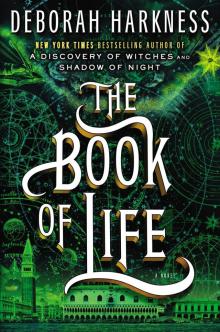 The Book of Life
The Book of Life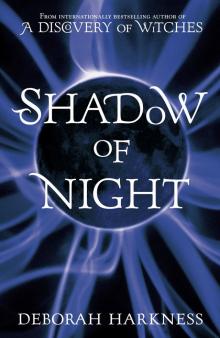 Shadow of Night
Shadow of Night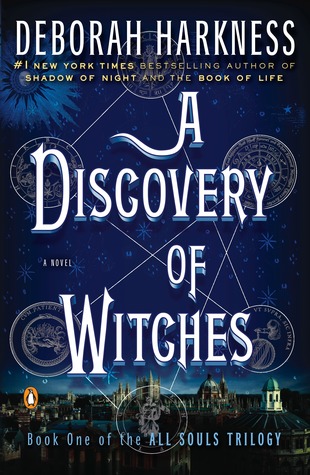 A Discovery of Witches
A Discovery of Witches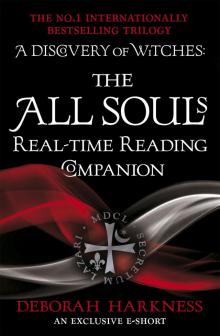 The All Souls Real-Time Reading Companion
The All Souls Real-Time Reading Companion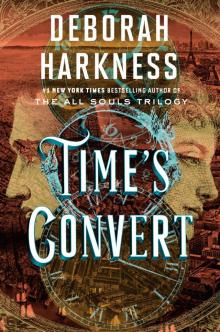 Time's Convert
Time's Convert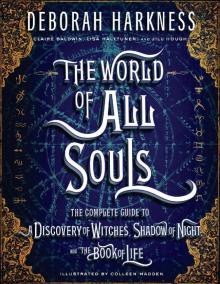 The World of All Souls
The World of All Souls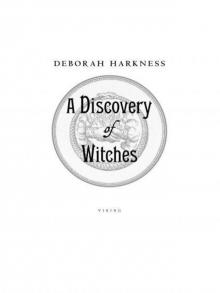 A Discovery of Witches: A Novel (All Souls Trilogy)
A Discovery of Witches: A Novel (All Souls Trilogy)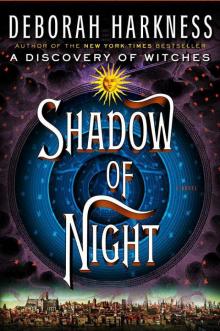 Shadow of Night: A Novel
Shadow of Night: A Novel